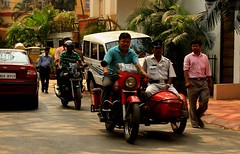Gregor Kern once said, “There’s nothing worse than bad films for a good cause.” I’m constantly astonished by how films made with the intention of addressing sexual and other forms of violence on women in India, are often so deeply misogynistic!
THE 50 MILLION MISSING CAMPAIGN BLOG ON INDIA'S FEMALE GENDERCIDE
 While pornographic packaging of female sexuality is blatantly used to hard sell Indian films, a woman’s libido and her consensual sex with partners of her own choosing continue to be “controversial” topics in Indian cinema. Forced marriages are not portrayed as rape. The marriage of rape victims to their rapists is often seen as a form of justice. And parents who prostitute their daughters are not viewed as pimps. In an article where she takes a critical look at how Bollywood films treat the subject of rape, consensual sex and prostitution, Rita Banerji argues that the reason Indian films fail to address these issues in a meaningful way is because the film makers, like the rest of Indian society, have failed to affirm a woman’s right and choice over her own body and sexuality.
While pornographic packaging of female sexuality is blatantly used to hard sell Indian films, a woman’s libido and her consensual sex with partners of her own choosing continue to be “controversial” topics in Indian cinema. Forced marriages are not portrayed as rape. The marriage of rape victims to their rapists is often seen as a form of justice. And parents who prostitute their daughters are not viewed as pimps. In an article where she takes a critical look at how Bollywood films treat the subject of rape, consensual sex and prostitution, Rita Banerji argues that the reason Indian films fail to address these issues in a meaningful way is because the film makers, like the rest of Indian society, have failed to affirm a woman’s right and choice over her own body and sexuality.
Below is are two excerpts from this article. To read the full…
View original post 1,099 more words













